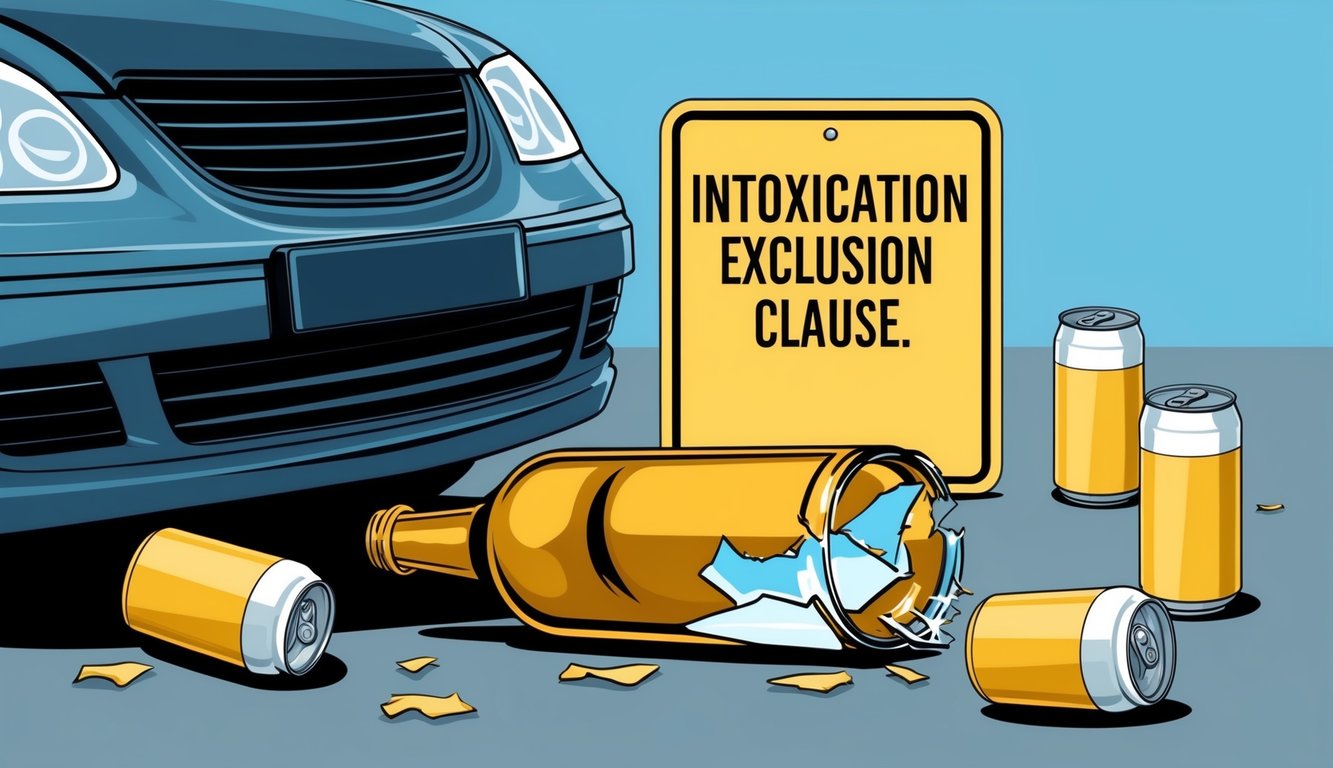Insurance policies have a lot of legal jargon and fine print.
Sometimes, hidden clauses can limit or void your coverage when you need it most.
Understanding these lesser-known provisions is crucial to ensure you receive the compensation you expect when filing a claim.
Your policy may contain clauses that restrict your ability to file claims or receive full payouts in certain situations. These can include anti-concurrent causation clauses, right to repair clauses, and appraisal clauses.
Being aware of these potential pitfalls can help you make informed decisions about your coverage and take steps to protect your interests if you ever need to file a claim.
1) Incontestable Clause
The incontestability clause is a critical feature in many insurance policies that you should be aware of.
This provision limits the time frame during which an insurance company can challenge or void your policy due to misstatements or errors in your application.
Typically, this clause stipulates that after a certain period—usually two to three years—the insurer cannot contest the validity of your policy based on information you provided when applying.
This protects you from having your claim denied long after you’ve been paying premiums.
It’s important to note that the incontestability clause doesn’t cover intentional fraud.
If you knowingly provided false information on your application, the insurer may still have grounds to deny your claim or cancel your policy.
The history of incontestability clauses dates back to the early 20th century.
They were introduced to address concerns about insurance companies disputing claims based on minor application errors or omissions.
When you apply for life insurance, you provide medical history and other personal information.
Once the incontestability period passes, your insurer generally can’t use errors in this information to deny a claim.
Remember, the specific terms of incontestability clauses can vary between policies.
Always review your policy documents carefully or consult with a professional to understand how this clause applies to your coverage.
2) Suicide Clause
Life insurance policies often contain a suicide clause that you should be aware of.
This provision typically applies during the first two years after your policy takes effect.
If you die by suicide within this period, your beneficiaries may not receive the death benefit.
Instead, the insurance company might only refund the premiums paid up to that point.
The suicide clause serves as a protection for insurers against individuals who might purchase a policy with the intention of ending their life shortly after.
It helps maintain fair pricing for all policyholders.
After the initial two-year period, most life insurance policies will cover death by suicide.
Your beneficiaries would then be eligible to receive the full death benefit, just as with other causes of death.
It’s important to note that the suicide clause may be reinstated if you make significant changes to your policy.
This could include increasing your coverage amount or converting a term policy to a permanent one.
When applying for life insurance, you’ll likely need to disclose any history of mental health issues.
Be honest in your application, as false statements could lead to denial of claims, even after the suicide clause period has passed.
3) War Exclusion Clause
The war exclusion clause is a critical component of many insurance policies that you might overlook.
This clause excludes coverage for damages related to war or similar activities.
It’s important to understand how this clause could affect your insurance claim.
You’ll find war exclusion clauses in various types of insurance policies.
These include life, disability, homeowner’s, and auto insurance.
The clause protects insurance companies from having to pay out claims resulting from acts of war.
Originally, the war exclusion clause was limited to international transport insurance.
However, it expanded to other insurance lines during the 20th century.
This expansion was a response to the increasing scale and destructiveness of wars.
You might think this clause only applies to traditional warfare.
However, in today’s digital age, it’s becoming relevant to cyber insurance as well. Cyber insurance policies may include war exclusion clauses that could leave your organization vulnerable to certain types of cyberattacks.
It’s crucial to carefully review your insurance policies.
Pay attention to the war exclusion clause and understand its implications.
This knowledge could prevent unexpected denied claims in the future.
Remember, insurance companies can’t accurately predict or price the risk of war.
This unpredictability is why they include war exclusion clauses in their policies.
Understanding this rationale can help you better navigate your insurance coverage.
4) Pre-existing Condition Clause
The pre-existing condition clause is a crucial aspect of insurance policies that you need to understand.
This clause allows insurers to deny or limit coverage for health issues you had before obtaining the policy.
Insurance companies cannot refuse coverage or charge you more for pre-existing conditions under many health insurance plans.
However, this protection may not apply to all types of insurance.
For long-term disability insurance, a pre-existing condition review is often triggered if you file a claim within the first year of coverage.
The insurer will examine your medical history for several months prior to your coverage start date.
It’s important to note that a pre-existing condition doesn’t necessarily mean you’ve been diagnosed.
Insurers may consider symptoms or treatments you received before your policy began as evidence of a pre-existing condition.
Be aware that the definition of a pre-existing condition can vary between policies.
Some may only look at diagnosed conditions, while others might include any related symptoms or treatments.
To protect yourself, carefully review your policy’s pre-existing condition clause.
Understand the specific timeframes and definitions used by your insurer.
If you’re unsure about how this clause might affect your coverage, consider seeking advice from an insurance professional.
5) Aviation Exclusion Clause

You might be surprised to learn that your life insurance policy may not cover you if you die in a private plane crash.
Many policies contain an aviation exclusion clause that limits coverage for aviation-related incidents.
This clause typically applies to private aircraft accidents rather than commercial flights.
If you’re a frequent flyer on private planes or enjoy recreational flying, this exclusion could significantly impact your beneficiaries’ ability to claim your death benefit.
The aviation exclusion is part of a broader category of high-risk activity exclusions in insurance policies.
Insurers implement these clauses to protect themselves from activities they deem particularly dangerous.
It’s crucial to read your policy carefully and understand its specific terms.
Some policies may offer limited coverage for aviation incidents, while others might exclude them entirely.
If you frequently engage in private aviation, you may need to seek specialized insurance coverage.
Some insurers offer additional riders or separate policies to cover aviation-related risks.
Remember that commercial flights are usually covered under standard life insurance policies.
The exclusion typically applies only to private or non-commercial flights.
Always disclose your aviation activities to your insurance provider when applying for coverage.
Failure to do so could result in a denied claim, even if you weren’t aware of the exclusion.
6) Intoxication Exclusion Clause

An intoxication exclusion clause is a provision in many insurance policies that you might not be aware of.
This clause allows insurance companies to deny claims if you were under the influence of alcohol or drugs at the time of an incident.
You’ll often find these clauses in accidental death and dismemberment insurance policies.
They can also appear in health, life, disability, workers’ compensation, and unemployment insurance policies.
The scope of these exclusions can vary.
Some may only apply to illegal substances, while others might include prescription medications or alcohol.
It’s crucial to read your policy carefully to understand what’s covered and what’s not.
Many states have laws permitting insurers to include these exclusions.
However, the interpretation and enforcement of these clauses can differ depending on your location.
You should be aware that these exclusions can have significant consequences.
If you’re injured while intoxicated, your insurance might not cover your medical expenses or other damages.
Some policies may have exceptions.
For instance, certain jurisdictions require coverage for alcoholism treatment, even if they allow intoxication exclusions in other cases.
To protect yourself, review your insurance policies carefully.
If you’re unsure about any clauses, don’t hesitate to ask your insurance provider for clarification.
Being informed can help you avoid unexpected denials of coverage when you need it most.
7) Illegal Acts Exclusion Clause

Insurance policies often contain an illegal acts exclusion clause.
This provision allows insurers to deny coverage for injuries or losses that occur while you’re committing an illegal act.
The scope of these clauses can vary between policies.
Some may only exclude coverage for felonies, while others might include any unlawful activity, regardless of severity.
It’s crucial to understand how your policy defines an illegal act.
In some cases, even minor infractions like jaywalking could potentially trigger this exclusion.
Insurance companies interpret these clauses differently.
Some may apply them collectively to all insured parties, while others might use a severability clause to apply the exclusion individually.
You should be aware that reckless behavior doesn’t always qualify as a deliberate act under these clauses.
Courts have interpreted “deliberate acts” to mean carrying out an action with the intention to cause injury.
Connecticut and other states don’t prohibit illegal act exclusions in health, life, or long-term care insurance policies.
This means your insurer can potentially deny coverage based on this clause.
To protect yourself, carefully review your policy’s wording.
If you’re unsure about the implications of an illegal acts exclusion clause, consider consulting with a legal professional or insurance expert.
8) Misstatement of Age Clause

The misstatement of age clause is a crucial provision in life insurance policies that you should be aware of.
This clause addresses situations where your age is incorrectly stated on your policy application.
Age plays a significant role in determining your life insurance premiums and coverage.
If you unintentionally provide an incorrect age, the misstatement of age clause comes into effect.
This provision allows the insurance company to adjust your policy benefits based on your actual age.
If you stated a younger age, your death benefit may be reduced to match the coverage you would have received for the premiums paid at your correct age.
Conversely, if you stated an older age, you might receive a higher death benefit or a refund of excess premiums.
The goal is to ensure fairness and align the coverage with your true risk profile.
It’s important to note that this clause applies to unintentional errors.
Deliberately misrepresenting your age could lead to policy cancellation or claim denial.
To avoid potential issues, always double-check the information you provide on your insurance application.
Accuracy is key to ensuring your policy functions as intended and your beneficiaries receive the expected benefits.
9) Beneficiary Designation Clause

The beneficiary designation clause in your insurance policy is crucial to understand.
It determines who receives the benefits of your policy when you pass away.
You might think your will takes care of everything, but that’s not always the case. Beneficiary designations supersede the provisions of a Will or Trust document.
This means if you’ve named someone in your policy, they’ll receive the benefits regardless of what your will says.
Keeping your beneficiary designations up to date is essential.
Life changes such as marriage, divorce, or the birth of a child can affect who you want to receive your benefits. Failing to update these designations is a common mistake.
Another pitfall to avoid is not naming a beneficiary at all.
If you don’t designate someone, your insurance benefits may end up in your estate.
This could lead to delays and potential tax implications for your heirs.
Be specific when naming beneficiaries.
Instead of listing “my children,” use their full names.
This clarity can prevent confusion or disputes later on.
Consider naming contingent beneficiaries.
These are backup recipients in case your primary beneficiary passes away before you do.
10) Grace Period Clause

The grace period clause is a provision in your insurance policy that allows for a short extension of time to pay your premium after the due date.
This clause typically gives you 30 days to make your payment without losing coverage.
During this grace period, your insurance remains active.
If you were to file a claim during this time, it would still be honored by the insurer.
It’s important to note that the grace period is not a free pass to delay payment indefinitely.
If you don’t pay by the end of the grace period, your policy may be terminated.
Some insurers might charge interest or late fees if you pay during the grace period.
Be sure to check your policy for specific details about these potential charges.
For life insurance policies, the grace period can be particularly crucial.
If the insured person dies during this time, the death benefit will still be paid.
However, the insurer may deduct the owed premium from the payout.
Don’t rely on the grace period as a regular payment strategy.
Consistently paying on time helps maintain a good relationship with your insurer and avoids potential complications.
Reduced Payouts
Hidden clauses can also limit the amount you receive on approved claims.
Sub-limits may cap payouts for specific items or events at levels below your policy’s overall limit.
Exclusion clauses can reduce your payout by excluding certain types of damage or circumstances from coverage.
For example, a homeowner’s policy might exclude flood damage, leaving you to cover those costs out-of-pocket.
Depreciation clauses can lower payouts by factoring in the age and wear of your belongings.
Instead of receiving the full replacement cost, you may only get the depreciated value.
Always review your policy carefully and ask your insurer about any clauses you don’t understand.
Consider consulting an insurance professional to help identify potential coverage gaps.






